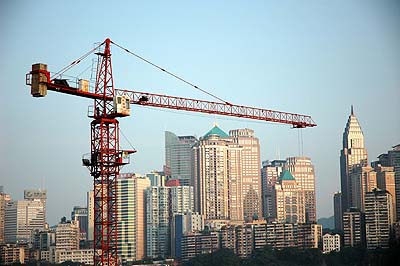|

How has China been managing its economy and what are the advantages of this management style?
Tian: China's economic development is essentially hard to be defined. Over the past three decades, Chinese society has experienced dramatic changes. When the reform and opening-up campaign began in the early 1980s, the Chinese economy was suffering from its primitive productivity and low efficiency. Much government intervention and a deficient legal system hindered its steps in the early days, and the Chinese mode of development at that time was labor-intensive.
As the reform deepens, it has shifted to a mode of operation more reliant on capital investment and high technology. Meanwhile, its ownership system has been restructured from a typical unilateral public ownership to a compound of various ownerships. Particularly in the past 10 years, hi-tech development, especially the great leap of the emerging IT industry, has helped accelerate diversification of this mode of operation, which has shown signs of its competitive edge in innovative competence.
A suitable economic system and facilitating policies are of vital importance to the development of an economy. The Chinese mode of operation fits its social reality, because the national strength can be increased much easier in a large economy.
Compared with other growing economies in Asia, like Japan, South Korea, Singapore and Taiwan, what are major characteristics of the Chinese mainland in its development?
Japan, South Korea, Singapore, and Taiwan, whose economic strength almost reaches the level of developed countries or regions, have gone through steady and balanced development. Due to its comparatively low productivity, China's fledgling economy, at the current stage, is not yet able to guarantee a long-term equilibrium. But one thing is for sure, in the next two decades the Chinese economy will maintain its fast growth. That is the biggest difference that distinguishes it from any other economies in today's world.
Chinese mainland's present situation is similar to that of Taiwan or South Korea in their early stages, when cheap labor forces were the focus. Now, the Chinese economy is largely characterized by labor-intensive industries, plus a transformation toward a more free market economy.
What are the side effects of the way China is managing its economy?
Many policies are temporary and transitional, which may not be the best choices in the long run. Some thorny issues, such as its lack of sustainability, mountains of waste and overexploitation of resources, are now surfacing because of the overemphasis given to the economic growth and market competition. The "treatment after pollution" formula has not only produced a large amount of waste, but also hampered further development. While on the other hand, excessive administrative intervention results in unnecessarily high market access thresholds in some industries.
How do you see the government's macroeconomic control efforts?
The major reason for China's opening success is a stable society under an effective government. The government is interfering less into business and commercial activities. Instead it looks more into safeguarding national security and maintaining the stability and order in society, to provide a relaxing but convenient social environment for individual development. That is also the secret of China's success.
An effective and trustworthy political system is essential for China's constant advancement. It responds only in the case of threats against industries related to state security, malfunction of market rules, or wild economic fluctuations.
There are two opinions about China's growth. One is that the country should follow the path of industrialized countries in order to realize its own industrialization; while the other is that as a populous nation, the scarcity of natural resources cannot sustain China's development like its Western counterparts, meaning it has to adopt an energy-saving strategy. Which opinion do you favor?
I prefer the first option, because overall modernization is unlikely in an energy-saving society. As long as China remains open to global economic integration and perseveres in market-oriented development strategies, it can share the benefits of the global market—this means easing domestic energy tension by making global purchases. In fact, China's remarkable achievements made over the past 30 years are largely attributable to its continuous opening up to the outside world. It has proven that a secluded and self-sufficient method of development doesn't suit China.
Still, China should not rush into an industrialized society like other developed nations. The United States is an agriculture-developed economy with high output earned by exporting agricultural products. The household contracted responsibility system with remuneration linked to output in rural China is losing its original incentive role after 30-odd years in practice. Due to agricultural modernization and productivity enhancement, surplus rural labor is being freed to help boost industrial growth. Quick urbanization also demands a large labor force. In the short term, China's economic climate will not be dramatically changed. But in the long term, the social and economic climate will revolutionize and bring about policy reforms.
A step-by-step reform has been widely recognized by the international community as a possible and feasible way for economic transition. What is your opinion?
The core of the so-called gradual transition is to coordinate social, political and economic development in a transitional economy. Given this, it could be a long process.
| 